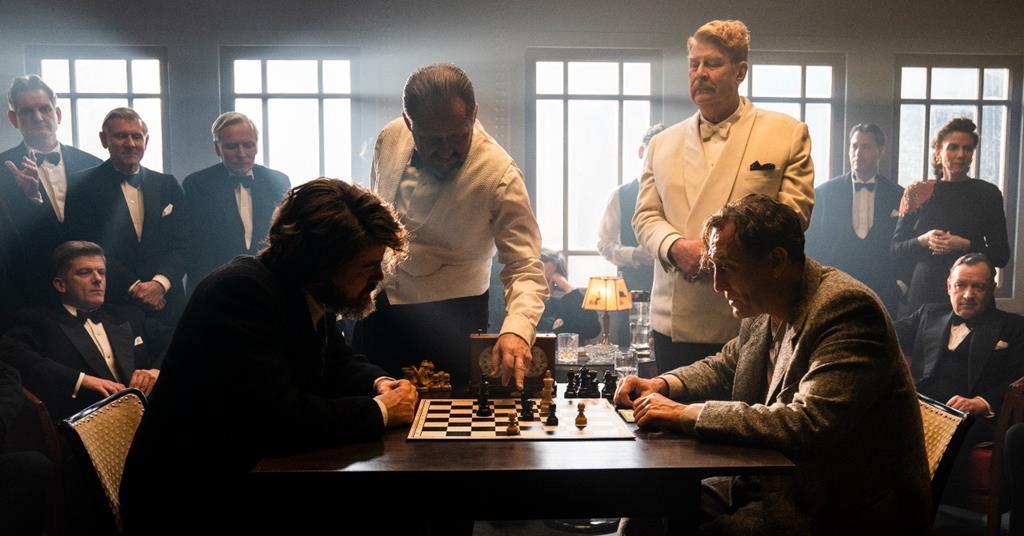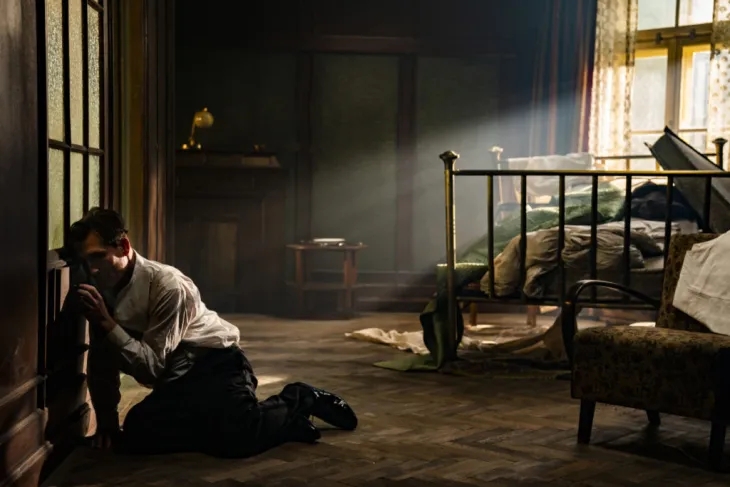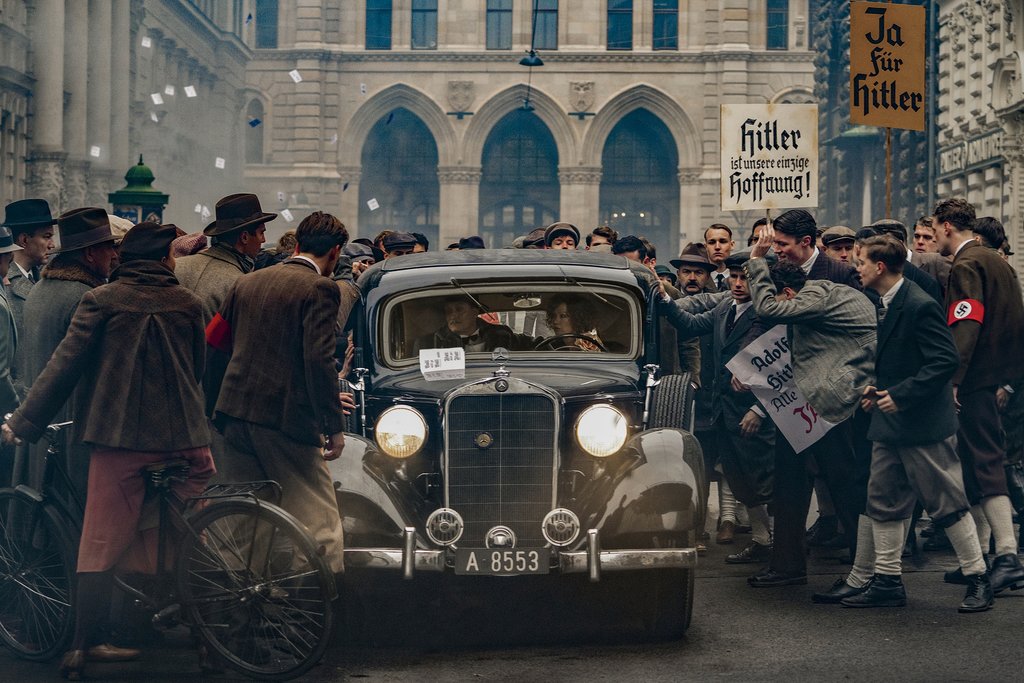
The early 20th century Austrian novelist Stefan Zweig has had a pretty good run when it comes to adaptations of his work into film.
His novella, “Letter from an Unknown Woman” became one of the great screen romances and one of the loveliest films ever shot in black and white thanks to Max Ophüls’ 1948 treatment. Scores of his books and stories have become films, his play “Volpone” has been filmed several times, and Wes Anderson gave him a deserved “inspired by” credit for his glorious “Grand Budapest Hotel.”
When you write compact, moving and atmospheric novels filled with pithy dialogue, filmmakers will beat a path your door.
His symbolic and moving psychological drama “Chess: A Novel” was filmed as “Chess Story,” titled “The Royal Game” when it was released in Europe. It’s a showcase of the film-friendly glory that was Zweig, a lush period piece about Vienna as the Nazis takeover, a cryptic story of money, character, guilt and chess. And as our hero, the Viennese Dr. Bartok lets us hear, it is damned quotable.
“As long as Vienna keeps dancing, the world can’t end,” he purrs in (subtitled) German to his wife, Anne, on the ballroom dance floor. “Vienna survived the Turks. It’ll survive the Germans.”
Dr. Bartok, played by Oliver Massuci of “Look Who’s Back,” a Hitler-mocking comedy, and a member of the “Fantastic Beasts” universe, is a rich, entitled man headed for a great fall. But even after all he goes through, he retains his wit.
“You must be either very proud or very wealthy,” a stranger wonders.
“I used to be both.”
The framing device is an ocean voyage, passengers boarding a liner from Rotterdam, bound for America. A shellshocked Bartok meets his loving wife (Birgit Minichmayr) as they’re about to clear customs. She prattles on but he has a hard time summoning anything to say.
“How was it ‘back then?'” he asks, and she reassures him of the glories of pre-war Vienna. Their fellow passengers appear to be swells, the “dress for dinner” type. But in their spartan cabin, Josef, traveling under the name “Max,” is taken back to 1938, the day of The Anschluss.
Josef’s newspaper headlines a call for everyone to vote “No” on the referendum to be held that week on merger with Germany. He and Anne dress for a gala, but the drive to the grand ballroom is fraught as their Mercedes limo is surrounded by torch carrying, marching Nazis, screaming their contempt at the rich, a rabble who needs “someone to blame for their hunger,” Josef notes.
But surely they’re not the majority. Surely Austria won’t vote…
Bartok’s friends and associates that night all call him by his nickname, “The Notary,” as he and his circle of peers — many Jewish, it is implied — joke about the Nazi regime and its leaders.
But one friend (Lukas Miko) warns him of the dire things to come, and within hours. “The Notary” is in the act of burning his papers when he is taken.
We learn what that nickname means when the urbane, well-dressed goon (Albrecht Schuch) takes him into custody at Vienna’s finest hotel, with Bartok still in his formal wear.
The good doctor is an asset manager, the son another of such advisor/investor. The fortunes of Vienna’s most fortunate are in secret accounts abroad in his care, and only Bartok can tell the Germans how to get to them.
Meanwhile, on the ship, Bartok as “Max” is making a scene, drinking too much and interfering in a series of speed-chess matches with the “world champion,” a bearded, disheveled and illiterate mute from Hungary, his manager insists. Somehow Bartok, who once dismissed the game his interrogator asked him about as “a pastime of bored Prussian generals,” found the time to master it.
“Chess Story” is how that came to be, and how it will figure into this voyage.



“Chess Story” was directed by Philipp Stölzl, the Bavarian filmmaker known for such period pieces as “North Face” and “Young Goethe.” He was entrusted with turning Noah Gordon’s popular novel of Medieval Europe and a medically curious young Westerner who poses as a Jew to study at the feet of a famed Persian physician, and made a gorgeous Ben Kingsley/Stellan Skarsgaard showcase, “The Physician” out of it. This story is in safe if not exactly the most-celebrated hands.
Here, he and screenwriter Eldar Grigorian maintain a disorienting sense of mystery as to what’s really going on. Bartok is kept in that Hotel forever. The later sea voyage seems oddly out of time, literally so, as Bartok seeks clocks spinning backwards.
And the chess that he loses himself in is as much a mark of madness — in melodramas like this — as it is genius.
Masucci cagily plays Bartok as a broken man with flashes of sentient outrage in the shipboard scenes, and as a man of principles and stubborn loyalty in the flashbacks, not quite haughty, but someone used to dismissing lesser lights that trouble him, with or without those damned armbands.
The novelist Zweig isn’t necessarily parked on some pedestal of great 20th century literature, but he produced cleverly-plotted entertainments populated by flawed romantic heroes and heroines.
That’s what “Chess Story” is, mournful and just cryptic enough to leave you guessing what you just saw, but touched, engaged and intrigued by it, comfortable in realizing that over-explaining is not necessary and would spoil some of the fun.
Rating: unrated, violence, sex
Cast: Oliver Masucci, Birgit Minichmayr, Albrecht Schuch, Lukas Miko and Rolf Lassgård
Credits: Directed by Philipp Stölzl, scripted by Eldar Grigorian, based on a novel by Stefan Zweig. A Film Movement release.
Running time: 1:52

